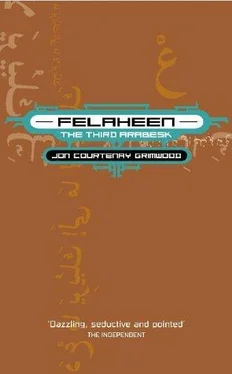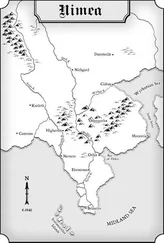The room her uncle used was dark, silent and damp so Hani folded back his shutters to let in air and with it sodium haze from the surrounding city. Directly below was the courtyard, its fountain silent, and beyond the courtyard a flat-roofed store used by Hamzah's builders. In the old days the open-sided store had been a room for entertaining visitors not quite grand enough to be invited up to the qaa . Now it was full of sacks of cement, endless sheets of glass sorted into piles and machines for sandblasting metal.
On the far side of the store began the garden. Only most of its roof was gone, each glass pane carefully removed so that the supporting framework of Victorian girders could be stripped back to metal, treated against rust and repainted. In the middle of the garden, staring blindly into a muddy pit that would become a carp pond stood Zara, unaware of being watched. Unaware, it seemed to Hani, of anything very much since Uncle Ashraf's disappearance.
In one corner of her uncle's room was a bateau lit , sheets folded down neatly. A silver chair, made from walnut overlaid with beaten metal, stood next to it. Apart from that there was only a double-fronted wardrobe against one wall, doors inset with matching oval mirrors that reflected Hani back to herself, a silhouette watching a silhouette, and a bow-fronted walnut chest against another wall. A tatty rug occupied the floor in between.
Having confirmed that there were no loose tiles beneath the rug, Hani debated her next move and decided on the wardrobe. In a shoe box underneath it she found a revolver and picked this up by the handle, only then remembering to consult the notebook she'd borrowed, her tiny Maglite playing over the fat man's spidery writing. It took Hani longer than she liked to find the right page.
Never touch evidence with bare hands . . .
Well, that was a good start.
Doing something clever like hook her torch through the revolver's trigger guard was out because Hani needed that to see what she was doing. And while it was true there were wire clothes hangers, any one of which would have done, dozens of the things on an otherwise empty rack in the wardrobe, just looking at those stung the back of Hani's legs. So instead Hani transferred her grip from handle to trigger guard and brought the barrel up to her nose. It stank of old fireworks.
Other than this the wardrobe was bare. Nothing on top or in either drawer beneath.
Search systematically , said the notebook.
For all its dusty elegance and probable value, Raf's chest of drawers was equally devoid of clues, lined with crinkled white paper and filled mostly with dust and dead spiders. Just to be thorough Hani yanked out one drawer after another to check that no one had taped anything important to the back.
She knew for a fact Donna had tidied no clues away because the old woman was far too terrified of her uncle to enter his room. It was Khartoum who cleaned this floor and Khartoum had been nowhere near the main house for . . .
Now that was interesting.
Hani thought about it and grinned.
Once she was done here, she'd wander over to the porter's room next to the back entrance of the madersa and have a serious talk with Khartoum, assuming she still had time. The arrival of her cousin the Khedive obviously took precedence.
Make notes , the book said somewhere. So Hani wrote bedroom in pencil on a blank page towards the end and put a tick next to it. On the line below she wrote bathroom .
Her uncle's cast-iron bath was full of dust, its enamel yellow with age. One of the claws at the tap end showed black metal where an old accident had chipped the surface away. Maybe his shower cubicle would hold more clues.
Make that any clues , Hani thought to herself.
Coal tar soap. A dry flannel. Camomile shampoo. The shampoo was half-full and the flannel as stiff as peeled skin. It was the soap that was interesting. Tiny splinters of hair porcupined its surface. Not washed-out strands as one might expect but clippings. Dropping to a crouch, Hani ran one finger across the bottom of the shower tray and came up with a whole crisscross of clues.
He'd cut his hair then. No, Hani crossed that out and pencilled in cropped instead. Uncle Ashraf had cropped his hair. And that meant he was in disguise. Something she should have known from the missing jellaba. Disguise meant Uncle Ashraf was on a mission. Hani nodded to herself, heading for the lift. There was work to do. Khartoum would have to wait.
"His Highness the Khedive . . ." A lifetime of cigars gave the old Sufi's words gravitas to go with their edge.
The slim boy in the dark suit nodded to Khartoum, then glared around the almost deserted qaa. Etiquette demanded he be met at the door to the al-Mansur madersa but the only person to be found at the entrance on Boulevard Sherif had been polishing its door knocker.
And it didn't help Tewfik Pasha's self-esteem that Khartoum still had his cleaning cloth dangling from one hand like a dead hare. In fact, thinking about it, Tewfik Pasha decided he should have insisted on bringing his bodyguards with him rather than leaving them on the sidewalk by the Bentley.
"Your Highness."
Very slowly Zara put down her needlepoint and climbed to her feet. She was working on a circle of canvas stretched over a large hoop, onto which she'd sketched a map of the world. Zara hoped the Khedive appreciated her artistry. Particularly the fact she'd chosen to edge his domains in the exact blue used to outline Prussia.
"This is a pleasure," said Zara, her tone indicating that it was anything but . . .
If Tewfik Pasha noticed the cheap silver band on Zara's finger he didn't let it show. Wedding rings were gold and what Zara wore signified, as it was intended to signify, that whatever she had it wasn't a marriage.
Actually it wasn't anything at all. A quick grope on a boat and two nights heavy petting at the gubernatorial palace while Raf stood in as Governor and her father was on trial.
"Are you all right?"
"Why shouldn't I be?"
"No reason . . ." The faltering in the Khedive's voice revealed him for what he was. An anxious seventeen-year-old standing in front of a girl both older and out of his reach.
"Well, I'm here," Tewfik Pasha said.
"So you are," said Zara.
Glancing round anxiously, the Khedive almost flinched when he met Khartoum's sardonic gaze. "Perhaps Your Highness would like coffee?" The old Sufi's voice was slightly gentler than before.
"Coffee . . . ?" Tewfik Pasha wanted to be peremptory. To have grown men falter at his gaze and women wait on his slightest word–or was it the other way round? Whichever, the General could manage both without even noticing. While the most Tewfik could manage was to hold a room for a few tense minutes, provided one of his audience didn't answer to the name of Zara Quitramala.
"That would be good," he told Khartoum. "And perhaps some cookies . . . ?"
"At the very least Ashraf Bey should have been here as well," said Tewfik Pasha as he put down his tiny brass cup to suck mudlike coffee grounds from between his teeth. He sounded peeved and not at all princely. Somehow the thought of Zara with Ashraf Bey always had that effect on him.
"Yes," said Zara. "Then the three of us could have had a cozy chat."
Hani snorted. She couldn't help herself. And having given away her position, she jumped down from the top of the lift, which was an excellent place for seeing everything without being seen, and landed in an untidy jumble of arms and legs.
The Otis had been unused for the last half an hour; which was twice as long as Zara had been sitting in the qaa wondering exactly why His Highness the Khedive of El Iskandryia might suddenly decide to pay an impromptu visit. Now she knew.
Читать дальше












